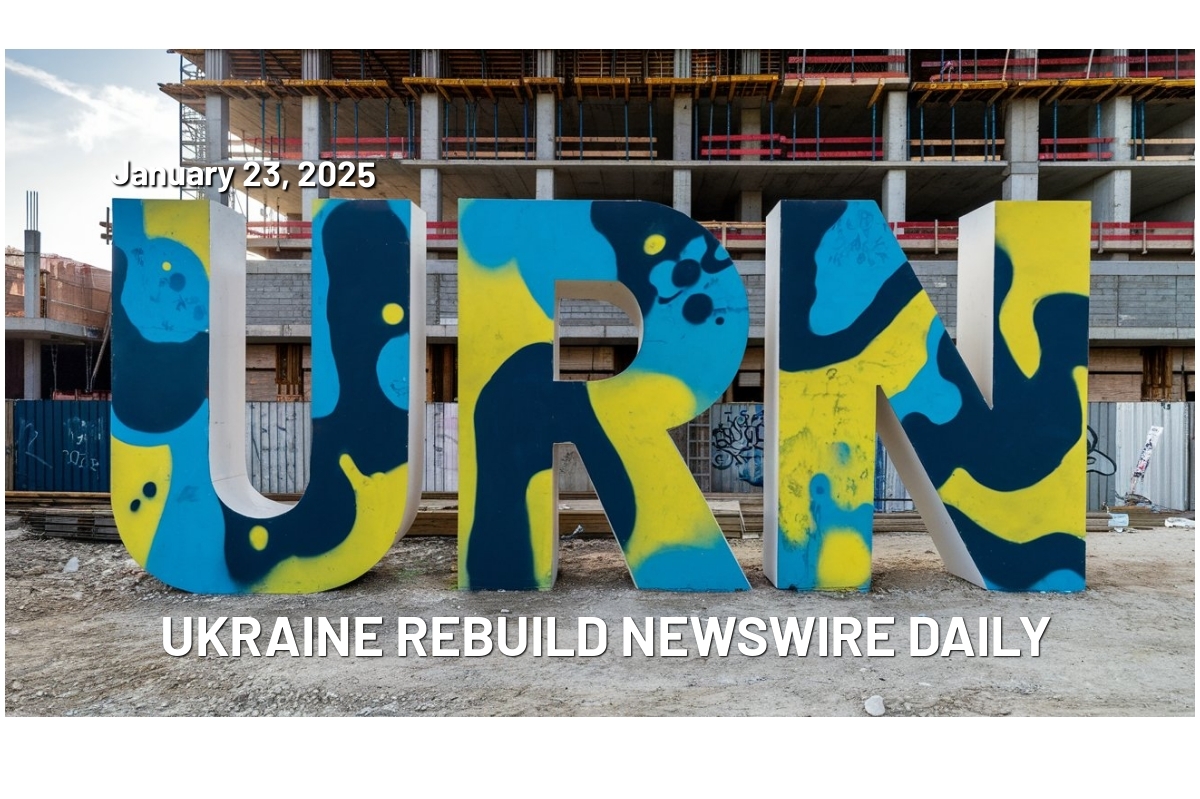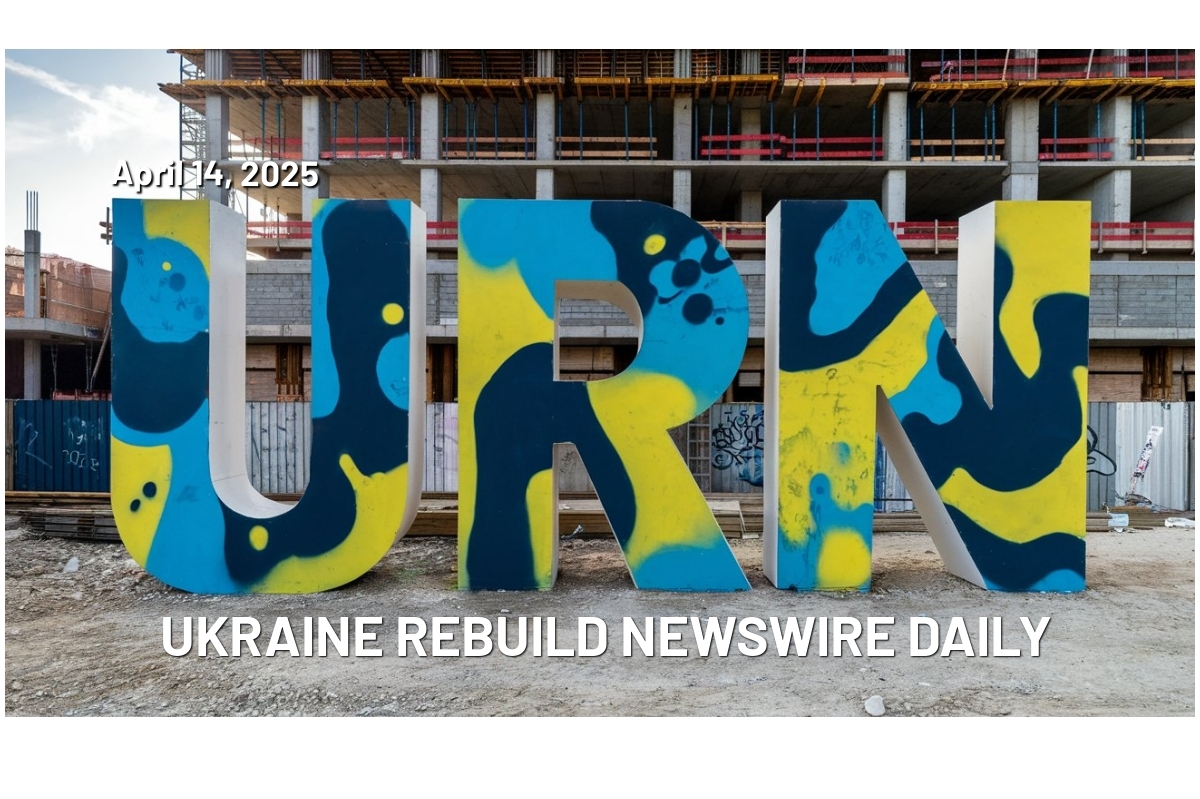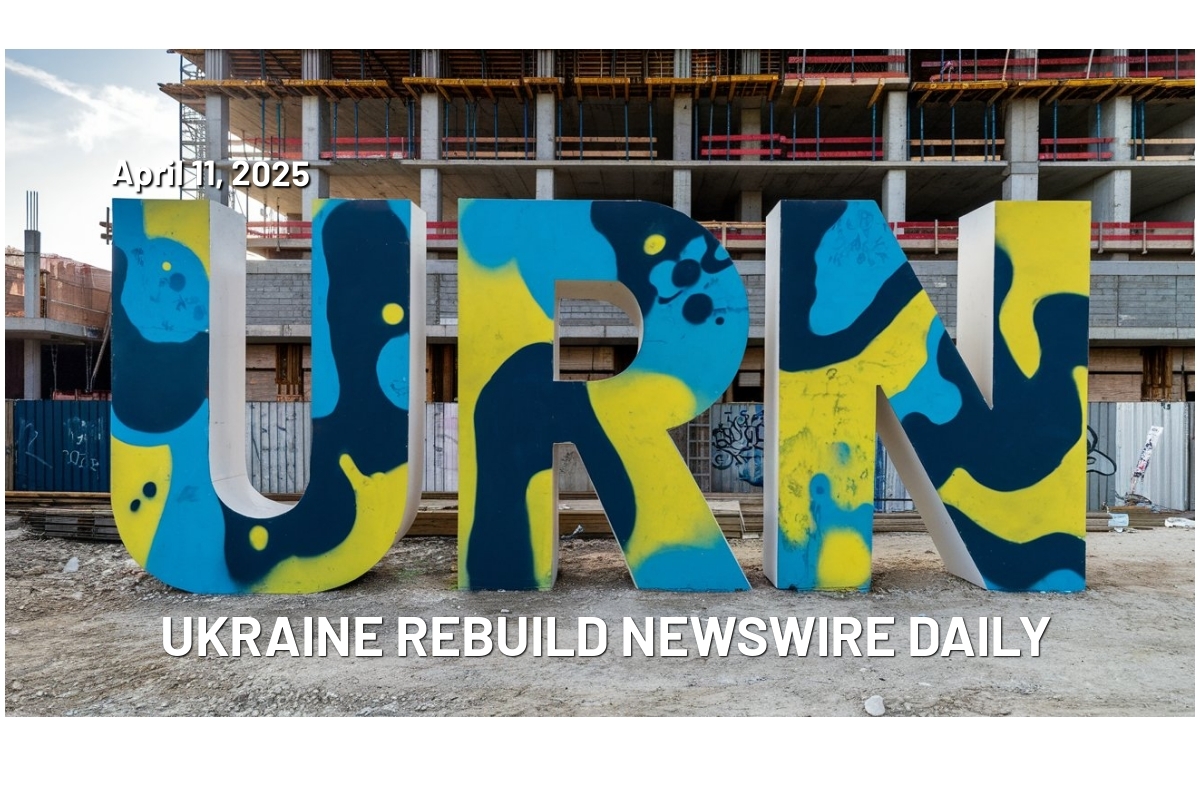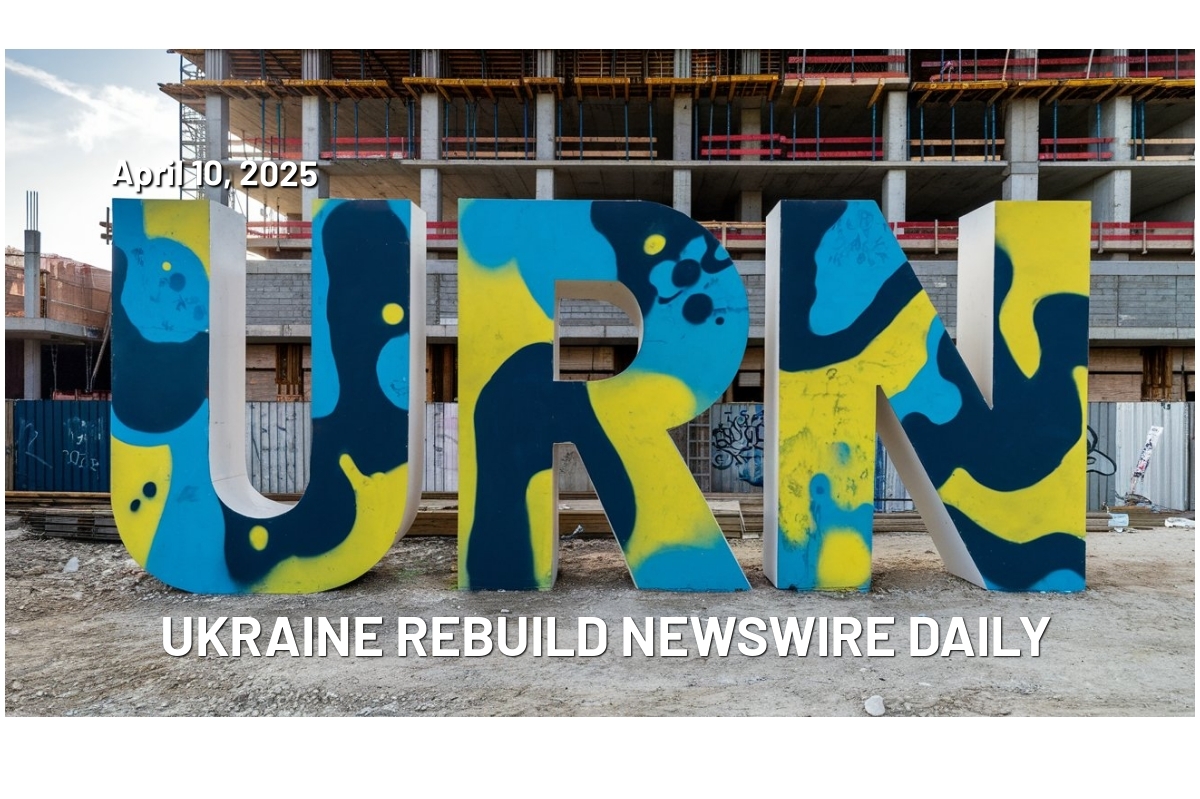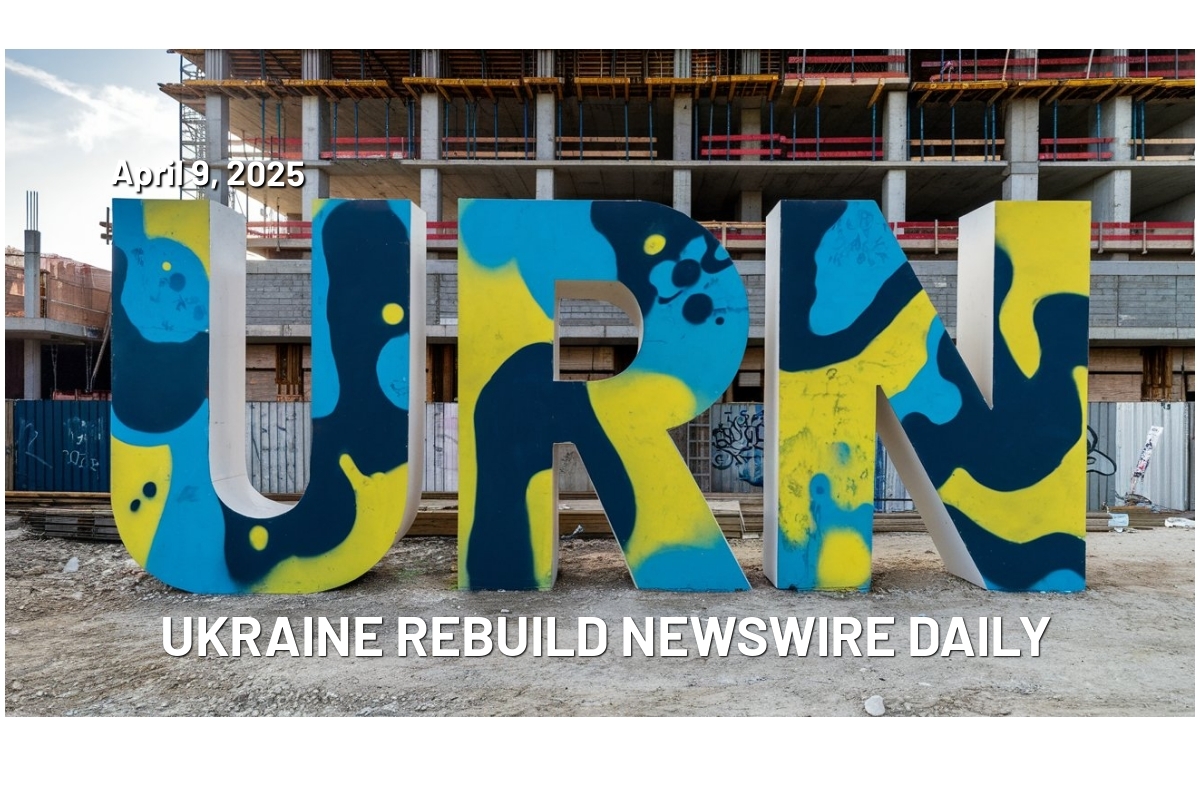Today's Newsletter Contents
Reporter's Notepad:
- Chatter at Davos: Flights to Lviv by Easter? Plus, talk of a new Ukrainian national investment plan, and the Italian challenge of involving SMEs in €1 billion projects
Just The Facts:
- Trump threatens new sanctions against Russia if deal to end Ukraine war not reached
- Putin grows worried about Russia's wartime economy as Trump urges peace, sources say
- Ukraine's MHP says it suffered largest cyber attack ever, taking down IT infrastructure
- Ukraine's Rovertech sets landmine clearing record of 10 hectares per day
- Rebuilding Ukraine will 'trigger EU economy' with the 'project of the century,' foreign minister says
- Investors eye Ukraine's potential but demand security guarantees, economy minister says
- EU, Denmark, and Lithuania support Ukraine's EU accession with €14 million program
Here's What They Think:
- Le Monde: Europe must spend more on defense to back Ukraine's security
- Atlantic Council: Trump's pledge for strong US leadership should start with Ukraine
- Newsweek: Trump's second term may lead to change in Ukraine's leadership
Sober Second Thought:
- Security, territory, neutrality: HCSS paper examines likely pitfalls of a Trump-brokered peace deal

Dear subscriber,
A whisper often says more than a shout. And a snippet of conversation can deliver more value than a 16-pt headline.
So here, in Reporter's Notepad, are the snippets - bits of conversation picked up on the third day of the events at Davos.
Scroll down further to Just the Facts for the headlines, then That's What They Think for the opinions, and Sober Second Thought for the white paper or scientific study of the day, then toward the bottom for the social media posts of the day in The Rebuilders' Social.
'National investment strategy' revealed by July
We have observed for some time now that journalists can rely on Oleksii Sobolev, Ukraine's deputy economy minister, to regularly deliver nuggets of news, even while tapping on his phone. In Davos it was the same.
"What we're trying to do right now is create an investment strategy for Ukraine and understand how we're going to make it happen," he said, phone in hand. "There are a lot of sectors that we agree are important - critical minerals, energy, agriculture and, of course, defense. So we need to move forward from that."
"So, with a very broad section of organizations, like the World Bank, IFC, McKinsey, BDO, EY and Deloitte - probably I'm forgetting somebody else - we worked out the concept for the strategy. We hope to present the strategy at the URC (Ukraine Recovery Conference in Rome on July 10-11)."
The Heraclean effort behind the URC in Rome
Also in Davos, Davide La Cecilia, Italy's special envoy for the reconstruction of Ukraine, described what appears to be a Herculean effort (or Heraclean for our Roman purist subscribers) effort to organize the Ukraine Recovery Conference in Rome.
Four preparatory events will be held, starting with an "international business event" on March 5 in Milan with 200 Italian companies, 100 Ukrainian companies and 100 international companies. That will be followed by a "civil society" event in Kyiv on April 2, followed by a reform-themed event in Brussels, and then an event on "the local dimension" in Verona on May 10.
Sewing Italian SMEs together
La Cecilia added that Italian businesses are brimming with interest in participating in the reconstruction of Ukraine. The problem is their size.
"We have 4 million small and medium companies willing to participate in this process. But of course, for them, it's too difficult to access the big projects of the reconstruction work - an €800 million project, a €1.2 billion project. So we need to find a way to sew them together to make the reconstruction more accessible. The answer is to have more partnerships, to build more opportunities for contacts and connections."
Fly to Lviv for Easter?
A discussion about war risk insurance in Davos turned, inevitably, to the question of when airports will open back up in Ukraine.
"I think the airlines are ready, the regulators are ready, pending air defense," said Crispin Ellison, a partner at Oliver Wyman, which is helping the Ukrainian government work out the insurance issues. "Lviv airport is out of range of Russian air defense missiles, so Lviv is actually quite possible. Hopefully, in a few months, we may have some good news."

Trump threatens new sanctions against Russia if a deal to end the Ukraine war not reached
US President Donald Trump said on Wednesday he would impose new sanctions against Russia as well as taxes and tariffs on Russian products if a deal to end the war in Ukraine is not reached soon.
"If we don't make a 'deal,' and soon, I have no other choice but to put high levels of Taxes, Tariffs, and Sanctions on anything being sold by Russia to the United States, and various other participating countries," Trump said.
"Let's get this war, which never would have started if I were President, over with! We can do it the easy way, or the hard way - and the easy way is always better," Trump wrote in a post on Truth Social.
Trump said he was not looking to "hurt" Russia.
"I love the Russian people, and always had a very good relationship with President Putin … We must never forget that Russia helped us win the Second World War, losing almost 60,000,000 lives in the process," Trump wrote.
The US has already introduced a number of measures and sanctions targeting the Russian economy, individuals, and its military-industrial complex since the invasion of Ukraine in 2022.
Earlier this month, the US Department of Treasury announced it had imposed sanctions on Russian oil majors Gazprom Neft and Surgutneftegas, as well as on 183 vessels mostly part of Russia's shadow fleet, among others.
Putin grows worried about Russia's wartime economy as Trump urges peace, sources say
Russian President Vladimir Putin is growing increasingly concerned about the country's economy as US President Donald Trump calls for the war in Ukraine to end, five unnamed sources familiar with the matter told Reuters.
Putin believes key objectives of the war in Ukraine, such as securing a land corridor to Crimea and weakening Ukraine's military, have been achieved, according to a Kremlin insider. He is also aware of the war's economic toll, including the strain of high interest rates on non-military businesses and industries.
Putin's frustration surfaced during a Dec. 16 Kremlin meeting with business leaders, where he reprimanded top economic officials, according to two sources familiar with internal discussions who spoke to Reuters. One source, briefed after the meeting, said Putin was visibly upset upon learning that high credit costs were leading to cuts in private investment.
On Wednesday, Trump said he would impose new sanctions against Russia as well as taxes and tariffs on Russian products if a deal to end the war in Ukraine is not reached soon, noting that Russia's economy was "failing."
Despite facing multiple rounds of Western sanctions following its 2022 invasion of Ukraine, Russia's export-driven economy, fueled by oil, gas, and minerals, experienced robust growth over the past two years, Reuters reported.
However, domestic activity has recently been under pressure due to labor shortages and high interest rates imposed to curb inflation, which has surged amid record military spending.
That has contributed to the view within a part of the Russian elite that a negotiated settlement to the Ukraine war is desirable, two of the sources told Reuters.
Ukraine's MHP says it suffered largest cyber attack ever, taking down IT infrastructure
Ukraine's agricultural producer MHP said on Wednesday it has been targeted by the largest cyber attack in its history.
As a result of the attack, part of MHP's IT infrastructure was not working and the shipment of products was taking place in a limited capacity.
MHP enterprises continued to operate, but with changes in processes, the company said in a post on LinkedIn. Retail chains Myasomarket and Food Fresh, and fast food chain Doner Market continued to serve customers.
"Our team is aware of MHP's role in maintaining the country's food security. We are making every effort to restore the IT system as soon as possible," the company said.
As of 1 am GMT+2 on January 23, MHP's website was still not accessible, with a "Server Unavailable!" message popping up.
MHP is one of the largest producers of poultry, culinary and processed meat products, as well as grains and oils, in Ukraine, employing around 30,000 people.
Ukraine's Rovertech sets landmine clearing record of 10 hectares per day
Ukraine's demining technology company Rovertech said it has set a new landmine clearing record in Ukraine of 10 hectares per day.
To achieve the record, Rovertech used its compact demining machine Zmiy, with a team of five people and 10–12 hours of work.
For comparison, manual methods would clear 0.15 hectares per day, while large demining machines would clear 2 hectares, Rovertech said in a press release.
All components of the Zmiy are manufactured in Ukraine, as per the statement.

Rovertech has introduced a leasing program for its demining machines, enabling sappers to use advanced demining technology without the burden of extensive fundraising efforts, TechUkraine.org reported, citing the company.
In August 2024, Rovertech's Zmiy was officially codified by Ukraine's Ministry of Defense of Ukraine and NATO, recognizing it as a reliable demining solution.
At the time, the government said that the Zmiy could clear 2.5 hectares a day and could cost as low as $14,500, adding that the cost could fall further upon mass production.
The Zmiy weighs a tonne, measures 85cm in height, and is designed to work in low and medium vegetation, destroying anti-personnel and anti-tank mines while removing tripwires, according to the company. It is now certified by the State Scientific Research Institute of Armament and Military Equipment.
Since the Russian invasion in 2022, nearly a quarter of Ukraine's territory is believed to be contaminated with mines and explosive ordnance, making it one of the most heavily mined countries in the world.
Rebuilding Ukraine will 'trigger EU economy' with the 'project of the century,' foreign minister says
Ukraine's Foreign Minister Andrii Sybiha stressed the potential for the reconstruction of Ukraine to be the "project of the century" during a panel discussion at the World Economic Forum (WEF) in Davos.
The continuous Russian "special military operation" in Ukraine since February 2022 has resulted in estimated damages of around €600 billion, which presents "huge challenges and huge opportunities," said Sybiha.
"I would like to raise reconstruction in Ukraine. It will be, probably the project, project of the century. It will be also, it seems to me, a trigger for EU economy. It will be an opportunity for EU economy, for EU companies," said Sybiha, according to Anadolu Agency.
Sybiha said 90% of Ukrainians support EU membership, and Kyiv "must achieve long-lasting, just comprehensive peace, because security of Europe and security of Ukraine is indivisible."
EU's 27 members should unite in the face of "geopolitical challenges" including the "brutal Russian aggression," Sybiha stressed, noting that there is a need to prevent "abusing or misusing of the right of veto of some EU members."
Croatian Prime Minister Andrew Plenkovic said that the war led to moving Ukraine, Moldova and Georgia from the "neighboring countries" category to the "enlargement pot." He added that "had there not been the February of 2022 we will be in a very different situation."
Montenegro's Prime Minister Milojko Spanjic stated that Ukraine "is part of the wider region," adding: "we feel we have common destiny, and we want to see Ukraine progress as fast as possible."
The panel included Ukraine's Minister of Economy Yulia Svyrydenko, European Parliament President Roberta Metsola, and Poland's Minister of Foreign Affairs Radoslaw Tomasz Sikorski, among others.
Investors eye Ukraine's potential but demand security guarantees, economy minister says
International businesses are ready to invest in Ukraine's war-torn economy, but would first need security guarantees from Kyiv, the country's Minister of Economy Yulia Svyrydenko said in an interview with Bloomberg.
Ukraine offers a wide range of opportunities for investors, spanning from reconstruction to growth of the defense industry, which Svyrydenko noted increased sixfold last year. The country also has rich deposits of raw materials, including uranium, which could lessen the EU's reliance on China and Russia.
Projects and investments in Ukraine are often insured, but foreign companies are concerned about military risks, Svyrydenko stated during the interview at the World Economic Forum in Davos.
"We are doing our homework," Svyrydenko said. "If you want to have business in Ukraine please make pressure on your government as well and please give your version of what the security guarantee is or can be."
Svyrydenko said that companies need a guarantee, such as NATO membership, military presence, or confirmations that Russia won't attack. "If it’s not NATO, then anti-missile systems are needed to protect industrial zones and cities."
Talks with business leaders have shifted towards cautious optimism, as the economy has grown for two consecutive years, and is expected to grow by 2.7% in 2025, Svyrydenko said, adding that the economy grew by 3.6% in 2024 alone.
The labor shortage is another major challenge Ukraine faces, with around 5 million Ukrainians fleeing to neighboring countries, including Germany, Poland, and the Czech Republic, according to Svyrydenko's estimates. She added that disruptions brought forth by energy outages is another "top, top priority" that needs to be resolved to attract investment.
During her visit to the US in December, Svyrydenko met with representatives from international companies in the US to discuss the Ukrainian market and overcoming barriers faced by investors.
The meeting included representatives from BlackRock, Citi, Bayer, Logistics Plus, PwC, Bank of American, Baker Hughes, Siguler Guff and others.
Svyrydenko said the focus of the businesses has now shifted from why they should invest in Ukraine, to what guarantees they would have if they choose to.
EU, Denmark, and Lithuania support Ukraine's EU accession with €14 million program
The European Union, Denmark, and Lithuania have launched a €14 million program to help Ukraine's institutions manage the path to EU accession.
The program will support key Ukrainian authorities, including the deputy prime minister's office, the government office for European and Euro-Atlantic Integration, the parliament's secretariat and European integration committee, and the ministry of justice as they implement reforms as part of the EU accession process.
The program will focus on strengthening the capacity of Ukraine's key actors to manage accession negotiations. It also seeks to raise awareness and understanding of the EU accession process among Ukrainian society, as well as targets supporting civil society organizations contributing to EU accession.
The program, to be carried out by the Lithuanian Central Project Management Agency (CPVA), will run from 2025 to 2027, the Ukrainian government said in a press release.
"EU accession is a key priority for our country, and this program will help us reinforce our capacities to navigate this complex process," said Ukraine's Minister of Justice Olha Stefanishyna.
"We are committed to making the most of this opportunity and look forward to working closely with our partners to achieve our European aspirations," Stefanishyna added.
Earlier this month, Polish Prime Minister Donald Tusk promised to seek to speed up talks for Ukraine to join the European Union during Poland's six-month term as president of the bloc. "The Polish presidency will break the impasse of last month to accelerate the accession path," he told reporters.
Ukraine has a total of 35 negotiating chapters to complete, which means the accession process could still take years.

Le Monde: Europe must spend more on defense to back Ukraine's security
European Union needs to start spending more on defense to be able to take greater responsibility for Ukraine's and its own security after the war in Ukraine ends, Le Monde editors wrote in an op-ed.
Europe must be ready to provide strong security guarantees to Ukraine once the war with Russia is over and it can only do that by recognizing that defense budgets must rise, the defense industry must be restructured, and societal resilience must be strengthened, the editorial read.
Atlantic Council: Trump's pledge for strong US leadership should start with Ukraine
Ukraine's fight for freedom parallels America's historic commitment to liberty, as exemplified by its battles for independence and against totalitarianism, which is why newly-inaugurated US President Donald Trump should start with Ukraine in delivering his promise of strong US leadership, Arseniy Yatsenyuk, former Ukraine's prime minister, wrote in an op-ed for the Atlantic Council.
With Russia's invasion posing a global threat to the rules-based international order, continued US support for Ukraine is essential to counter authoritarian aggression, safeguard international stability, and protect shared democratic values, Yatsenyuk argued.
Newsweek: Trump's second term may lead to change of Ukraine's leadership
Donald Trump's second term may not only lead to peace in Ukraine but it could also result in a change of leadership in Kyiv, offering hope for stability and reform after years of conflict, Steve Cortes, former senior advisor to Trump, wrote in an op-ed for Newsweek.
Cortes wrote that the trust in Ukrainian President Volodymyr Zelensky has eroded, with widespread allegations of corruption tarnishing his leadership and leaving many Ukrainians disillusioned. At the same time, General Valerii Zaluzhnyi, a celebrated military leader turned diplomat, has emerged as a potential alternative. Revered for his early battlefield successes and his reputation for integrity, Zaluzhnyi contrasts sharply with accusations of kleptocracy tied to Zelensky and his inner circle, according to Cortes.

Security, territory, neutrality: HCSS paper examines likely pitfalls of a Trump-brokered peace deal
The possibility of a Donald Trump-brokered resolution to the ongoing Russia-Ukraine war has sparked significant international debate.
A paper published by Clingendael and the Hague Centre for Strategic Studies (HCSS) explores the conditions under which such a deal might emerge. The researchers analyzed open-source proposals, expert commentaries, and policy discussions to evaluate potential outcomes and their implications.
The paper provided a detailed review of key negotiation points, such as security guarantees, territorial integrity, and external sovereignty. By focusing on these areas, the researchers aimed to inform European stakeholders of risks and opportunities tied to a peace deal.

One of the primary issues addressed in the paper is Ukraine’s need for security guarantees. While NATO membership remains the most robust option for Kyiv, alternative arrangements such as bilateral security guarantees or increased military support are discussed. However, Russia’s opposition to NATO expansion and demands for Ukraine’s neutrality complicate these prospects.
Ukraine appears willing to explore a "credible deterrence" strategy, which involves bilateral or multilateral security guarantees from individual NATO member states, the researchers argued. The approach would also include deploying Western forces and providing material support to strengthen its defensive capabilities.

Territorial disputes form another critical aspect of the analysis. Russia’s claim over Ukrainian territories, including Donetsk, Luhansk, Crimea, and parts of Zaporizhzhia and Kherson, contrasts sharply with Ukraine’s position, which insists on the restoration of its 1991 borders.
The Ukrainian government has clearly stated that it will not legally recognize Russian annexations or give up its claims to sovereign territory. The study highlighted how any compromise on territorial control may impact Ukraine’s sovereignty and the broader geopolitical balance in Europe.

Regarding external sovereignty, the study noted that Ukraine’s aspirations for NATO and EU membership face significant obstacles.
In Istanbul talks in 2022, Russia appeared open to Ukraine joining the European Union, according to the paper. However, the Kremlin might insist that Ukraine adopt a neutrality clause in its constitution, sign a politically or legally binding agreement with the US or NATO, or potentially do all these measures.
Russia’s demands for Ukrainian neutrality or even a pro-Russian foreign policy further exacerbate tensions, the researchers argued. The demands could undermine Ukraine’s ability to independently determine its international alignment, they concluded.
The paper also outlined risks associated with a quickly negotiated agreement. These include the potential for an unstable ceasefire, internal political instability in Ukraine, and a divided European response.
The researchers emphasized that a poorly conceived deal could lead to renewed conflict and long-term instability in the region. They urged European leaders to proactively define their positions and red lines before entering negotiations.
Their recommendations included increasing military and financial support for Ukraine, ensuring robust security guarantees, and maintaining a unified stance on European security.

New Global GovTech Board
Valeriya Ionan, deputy minister for Eurointegration at the Ministry of Digital Transformation of Ukraine, celebrated the launch, in Davos, of the Global GovTech Board, a platform to develop new technologies for government.
"Outdated bureaucratic systems, inefficient processes, and endless paperwork can all be left in the past if digitalization is approached with vision and strategy," she wrote. "Governments worldwide need new approaches based on transparency, efficiency, and citizen-centric solutions."
Tips for Investors
Maksym Maksymenko, head of real estate and infrastructure at the Ukrainian law firm Avellum, launched a series of posts, labeled "Tips for Investors" on the key submarkets of the Ukrainian electricity sector.
He started the series with a post describing the bilateral agreements market, the day-ahead market, and the intraday market.
Tourism Agency Chair Resigns
Mariana Oleskiv announced that she is resigning as chair of the State Agency for Tourism Development of Ukraine as her five-year contract comes to an end and her "role in the international tourism arena is deepening."
Sanctions Law
Ukrainian law firm Integrites promoted two articles written by its lawyers about the Ukrainian sanctions regime and its evolution since the 2022 full-scale invasion.
The first article covers the criminal liability for violation of sanctions, or lack of liability, and the second covers sanctions imposed late last year, forfeiture of assets, challenges to sanctions in court, and more.

URN Daily: Sense Bank and Ukrgasbank for sale? And US seeks to cancel $4.7 billion of Ukraine's debt

